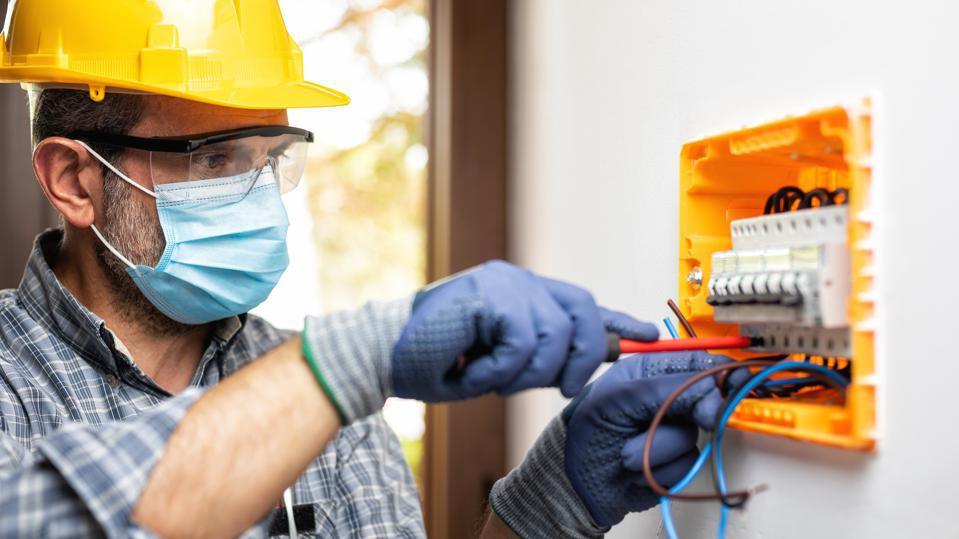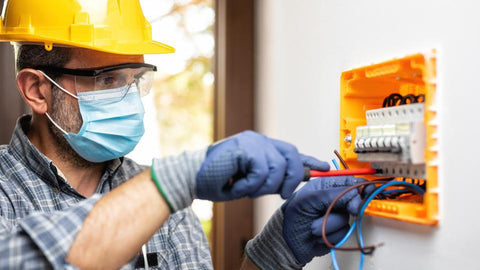
Most people wouldn’t consider blue collar work a lucrative job, but it can actually be a successful career path. One that provides a comfortable income for yourself and your family.
An electrician career path requires several different steps. The process may seem overwhelming, but it is not. Following our guide will provide you with the information you need to take the plunge.
There are many satisfying career options for electricians. You’re sure to find a place in the industry.

How do I become an electrician?
1.Get a basic education as an electrician
The first step in becoming an electrician is figuring out what education you need before you can consider a career in the industry. In order to become an electrician, you must first complete high school or complete a GED. If you never finish high school, you can still meet the requirements to complete a GED. Getting your GED is easy.
If you determined in high school that you wanted to be an electrician, you may want to consider taking some advanced courses in algebra and physics. These courses are important for some of the electrical work you will be doing. This early preparation will help you once you start school to become an electrician.
Then, you must take classes to prepare for the exam. The next step is to register and complete the test, and finally wait for your results.
2.Work as an apprentice and gain experience
One of the most important steps after earning your electrician degree is to obtain an apprenticeship. Applying for an apprenticeship may require some additional testing. This usually includes basic tests in reading comprehension and math.
You will also need to interview for the position, but don’t worry, as your program will provide you with the necessary advice to achieve the apprenticeship of your dreams.
The beauty of an apprenticeship is the combination of hands-on instruction with included coursework. You will work alongside an experienced electrician for up to five years and will be paid for your work. The training will provide you with the experience you need to enter the workforce at the end of your apprenticeship.
In the early stages of your apprenticeship, you will only have the opportunity to do simple tasks, but the more experience you gain, the more complex the work you will be involved in.
3.Get your electrician’s license
The most important step on the electrician’s career path is obtaining the proper licensing. This is required for you to work in a specific location.
The specific requirements for obtaining an electrician’s license vary depending on the state you live in, but typically, you will need to complete an exam that covers the topics you prepared for in your training. The licensing exam will cover topics such as the National Electrical Code and state-specific building codes.
Although you can practice your profession as an electrician once you are licensed, you will still want to pursue continuing education because amendments to the state code have been in flux over the years. This is an exciting part of an ever-evolving and changing field of work.
While you may think all this work may be too much for your career plans, know that it is totally worth the effort. There are many good reasons to pursue a career in the electrical industry.
Career Path Categories for Electricians
1. Electrical work in maintenance and construction
Electrical work in repair and construction is a very common career path for electricians. The most common parts of this job include wiring and repairing residential buildings.
Working in maintenance and construction can be an exciting career path because you will always be working in a different field. You will also see new buildings come to life as you work with the construction team on the electrical side. Helping to bring a new structure to life by actually providing it with light is a great and rewarding job.
2. Industrial Institutional Electrician
This type of work will have you working in a factory, and most of your work will include installation and basic maintenance, as well as any repairs needed along the way. You will also get to work with some very unique and interesting equipment. You will be responsible for the installation and maintenance of equipment such as switchboard meters, industrial batteries and hydraulic electrical control units.
3. Operator
Most of the electricians that the average person comes into contact with are operators. These are the electricians who work for your state and local power and light companies.
These crews are usually called to your home when a storm or other cause causes you to lose power. Linemen will also come to your home to repair downed power lines.
You will usually see these workers in the elevator repairing the wires and connecting them from the pole back to your house. They can also work on the ground in the trenches if needed.
Some of the equipment that linemen must use include transformers and traffic lights. This is one of the most common but most rigorous types of electrical work.
You will usually have to work outdoors during potentially severe weather. If you want to meet the challenge of a hot summer, a cold winter or after a big storm, then this is the career path for you.
4. Network Cabler
This career in the electrical industry can be very challenging and rewarding, as you will be helping to build different types of communication systems. This may include working for an Internet provider to install and maintain data systems or working in telecommunications to ensure proper video transmission.
Understanding the ins and outs of network cabling can be a challenge, but it’s nice to know that you’ll be helping to set up systems that help transfer information from one place to another. This line of work often requires you to maintain communication systems in educational institutions and offices in different industries.
Much of your work will involve installing cable in buildings and installing cable TV equipment in people’s homes. You will also be doing ongoing system upgrades.
5. Security Systems Installation Electrician
As an electrician, you may also work on security and fire alarm systems. You will work to install these systems in people’s homes or workplaces. There is nothing more rewarding than knowing that you will be helping to build systems to protect homes or workplaces from harm.
You will work directly with customers to install these systems based on their needs and the requirements of the building. Some of your work may include installing sensors on doors and windows, and installing cameras as part of a home security system. The other side of the job entails testing these systems to make sure they work properly and fixing any errors they may have.
Get the tools ready to start your career as an electrician
A career path as an electrician requires education and training and a lot of hands-on learning. Knoweasy’s toolsare great for novice electricians with poor skills and are less expensive than other brands of tools.